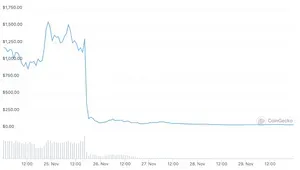Ubisoft announces it will be shoehorning NFTs into its Tom Clancy game
- "Ubisoft's NFT Announcement Has Been Intensely Disliked", Kotaku
- "Gamer-hate: Ubisoft’s new NFT project video gets 96% dislike ratio", Cointelegraph
- "Ubisoft's first NFT plans make no sense", Ars Technica
- "Ubisoft Devs Don’t Understand Company’s NFT Push, Either", Kotaku
- "No One’s Buying Ubisoft’s Garbage Ghost Recon NFTs", Kotaku
8ight Finance completely drained after private key leak
WildWorks angers its fans by announcing it will be moving into crypto gaming
WildWorks later split Cinder into a separate company, Cinder Studios. However, in early 2023, the studio shutdown, giving its employees no advance notice that they would soon be out of a job.
Coindesk writer Andrew Thurman says the quiet part out loud
Polygon loses $2 million to a vulnerability
Tether mints $3 billion in two weeks
Hackers steal about $200 million from BitMart
Wikipedia founder Jimmy Wales angers some in the Wikimedia community by announcing he will be auctioning off an NFT representing the first ever edit
SEC charges individual with two fraudulent crypto schemes
- "SEC Charges Latvian Citizen With Digital Asset Fraud", U.S. Securities and Exchange Commission
CODEX, a decentralized publishing platform, aims to artificially constrain access to books
$120 million is stolen from BadgerDAO
NFT collecter friesframe has a Bored Ape and several other valuable NFTs stolen
$31 million stolen from MonoX in smart contract bug
A project called "Unvaxxed Sperm" combines COVID-19 misinformation and memecoins
Either a rugpull or massive communication failure ends in disaster for most holders of SnowdogDAO's token
- "Avalanche’s first memecoin SDOG ends in a $30M possible rugpull", Cryptoslate
- "OlympusDAO Fork Snowdog Hit By 90% Crash", Crypto Briefing
Alleged serial scammer launches "MetaWorld" project for at least the third time
SEC charges individual with two unregistered securities offerings related to crypto
- "SEC Charges Promoter with Conducting Cryptocurrency Investment Scams", U.S. Securities and Exchange Commission
Senate committee demands answers from stablecoins including Tether
NFT creator makes more than $7.5 million from artwork he doesn't own
Game developers are forced to recreate their entire game after a bug is discovered
A DAO raised more than $40 million to try to buy a copy of the United States Constitution, failed, and then stumbled chaotically to its end
- "Crypto collective raises $40 million to buy rare copy of U.S. Constitution", Fortune
- "Crypto collective loses bid to buy rare copy of U.S. Constitution", Fortune
- "ConstitutionDAO Is Shutting Down After Unrelenting Chaos", Vice
- "'Buy the Constitution' Aftermath: Everyone Very Mad, Confused, Losing Lots of Money, Fighting, Crying, Etc.", Vice
Someone mints an NFT of 100 stolen furry profile pictures and sells it for $100,000
Chinese police bust Filecoin miner-related Ponzi scheme
Filecoin mining became popular in China after Filecoin's 2018 initial coin offering, and Ponzi schemes and scams based around the token also emerged. Mostly, these involved selling poor equipment or soliciting investment in so-called mining operations that promised exaggerated returns.
A group pitches the idea of a "Cryptoland" crypto-themed private island with a video that is nearly indistinguishable from satire
Hacker steals around $55 million from bZx
Media outlets are duped into believing that Kroger will begin accepting Bitcoin Cash
Blockchain Global enters liquidation
Creditor claims are likely to exceed $50 million. The operators of the company allegedly commingled customer, investor, and company funds, and used this pool of money on personal expenses and investments in other companies. The liquidator has recommended that the Australian Securities & Investments Commission (ASIC) investigate the company's directors, Sam Lee, Zijing "Ryan" Xu, and Liang "Allan" Guo.
Oracle manipulation attack against Vesper Finance nets hacker over $3 million
BXH exchange exploited for $139 million
Creators of a Squid Game-themed token make off with more than $3 million
NFT collector scammed out of almost $1 million
Developer of "Monkey Jizz" cryptocurrency makes off with $270,000
$60 million disappears in AnubisDAO project within a day of its launch
OpenSea NFT trading platform patches a vulnerability that had allowed hackers to steal from users
A much-hyped Miss Universe NFT project turns out to be a rugpull
Rapper Tekashi 6ix9ine releases a series of NFTs, only for the project not to deliver anything it promised
DeFi platform C.R.E.A.M. is hacked for a third time, this time for $130 million
A tech startup aims to solve the real problem with the U.S. justice system: the lack of gambling involved
"Realms of Ruin", a YA storytelling NFT project, collapses hours after launch
- "Inside the Realms of Ruin", TechCrunch
- "Realms Of Ruin Storytelling NFT Collapses After 5 Hours", GameByte
Successful exploit of the CreatureToadz NFT project briefly nets a poorly-disguised hacker 88 ETH (almost $350,000)
Hacker steals $16 million from Indexed Finance
Four NFT projects on the Solana blockchain rug-pull in one day
The creator of the "Evolved Apes" NFT project makes off with $2.7 million a week after launch
Baller Ape Club NFT developers rug pull for $2.6 million
Founder of DeFi platform Compound threatens users who received mistaken payments with the IRS
An NFT project developer steals $138,000, sending images of random emojis to buyers
German government's blockchain-based ID wallet removed from app stores shortly after launch due to major issues
- "ID Wallet: The German government had long known about IT security vulnerabilities", Market Research Telecast
- "Konzeptionell kaputt und ein riesiger Rückschritt", Netzpolitik.org


































